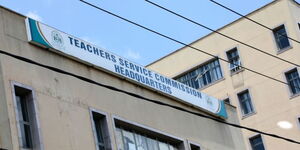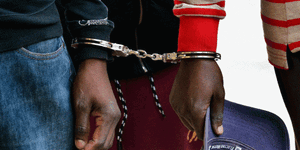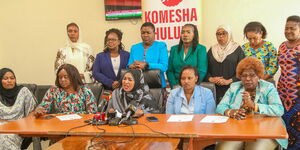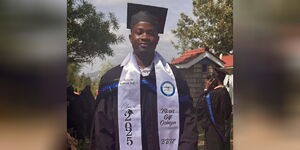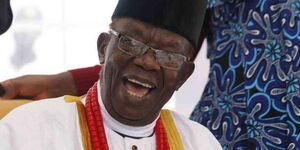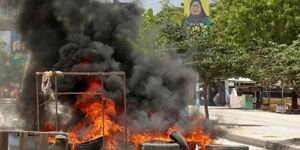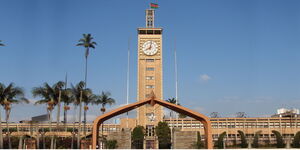Dr Jephnei Orina Nyakwama has thrown his hat into the ring for the African Union (AU) Commission Chairperson position, igniting a competition. The former United Democratic Alliance (UDA) presidential aspirant announced his candidacy on Monday, July 22, aiming to challenge the government's preferred candidate, Raila Odinga.
Orina, who once vied for UDA's top spot against William Ruto, expressed his motivation behind this bold move. He criticised the current candidates for not representing the continent's youth. "They don't represent the aspirations of the populace, which is primarily youth. Africa's median age is 19.7 years," Orina told Kenyans.co.ke.
Who is Orina: The newest addition is a lawyer with a distinguished academic background, holding three degrees from Kisii University and the University of Nairobi. He has been practising law in the United States.
Orina is keen to advocate for several transformative initiatives, including the introduction of a common currency for Africa, the creation of a unified market, and the establishment of a Central Bank of Africa.
Despite his enthusiasm, Orina faces an uphill battle against heavyweights like Odinga, who enjoys government backing.
The Race: The race for the AU's top job often turns into a tug-of-war among member countries, each pushing their preferred candidates. With the AU set to elect its new leaders in early 2025 and the registration deadline looming on August 6, the competition is intensifying.
Candidates must submit their credentials and vision statements, detailing how they plan to drive the AU's transformative agenda and tackle the continent's challenges. The elections will occur during the annual AU summit in Addis Ababa in February 2025, where eight senior leadership positions, including Chairperson and Deputy Chairperson, are up for grabs.
According to the AU's rotation schedule, the next chairperson will hail from East Africa, while the deputy chairperson will come from North Africa. Each region must submit male and female candidates for these roles. The Panel of Eminent Africans, a group responsible for the pre-selection process, will evaluate the nominees.
So far, Kenya, Djibouti, Tanzania, Somalia, and Seychelles have put forth candidates for the chairperson post. However, Ethiopian and Sudanese candidates are ineligible due to the AU's rules and sanctions. This limitation narrows the candidate pool but doesn't make the outcome any clearer. East African countries, divided by different regional blocs, have diverging interests that further complicate the race.
The AU stipulates that if the chairperson is male, the deputy must be female, maintaining gender balance. The current chairperson, Moussa Faki of Chad, and his deputy, Rwanda's Monique Nsanzabaganwa, reflect this structure. Faki, elected from the central region, was re-elected by 51 of the 55 member states for a term from 2021 to 2024.
The Panel of Eminent Africans, established in February 2024, oversees the pre-selection process. The Panel, comprising representatives from each region, sets criteria and competency requirements and conducts assessments on nominees. Members include Burundi's Paul Ngarambe, Ethiopia's Konjit Sinegiorgis, South Africa's Nozipho Joyce Mxakato-Diseko, and Ghana's Patrick Hayford.
Ultimately, the Assembly of Heads of State and Government will elect the chairperson and deputy chairperson, while the Ministerial Executive Council will appoint the six commissioners. Before the elections, chairperson candidates will participate in a televised debate, MjadalaAfrika, to present their vision to a broad audience.
Among the prominent figures likely to participate is Raila Odinga, Kenya's former Prime Minister and AU High Representative for Infrastructure Development. President William Ruto has been lobbying various governments for Odinga's nomination, emphasising the national interest. "This is not about our local issues. We must project the national interest for Kenya," said Musalia Mudavadi, Kenya's foreign affairs cabinet secretary.
Odinga, with endorsements from a dozen African nations, announced his bid for the chairmanship in February. However, his candidacy has faced scrutiny, with questions about his suitability at 79 years old. Other notable nominees include Fawzia Yusuf Adam, Somalia's former deputy PM and foreign minister, Mahmoud Ali Youssouf, Djibouti's foreign minister, Vincent Meriton, Seychelles' former vice president, and Jakaya Kikwete, Tanzania's former president.
The diverse pool of nominees highlights the struggle for consensus in the Eastern African region, known for its divergent interests. This division poses a significant challenge for Odinga's candidacy, as achieving regional consensus remains difficult.
The new AUC chairperson will face significant continental priorities, including AU institutional reforms, a task championed by President Ruto. The continent has experienced numerous challenges, including a deadly pandemic, multiple coups, and ongoing conflicts, underlining the need for strong leadership.
Africa has seen no fewer than nine successful coups since 2020, with many failed attempts. Most coups have occurred in francophone West Africa, known as the 'Coup Belt,' but Chad and Sudan have also been affected. The implementation of the African Continental Free Trade Agreement (AfCFTA) remains in its early stages, with few countries initiating trade under the scheme since January 2021.



